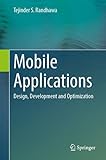Mobile Applications [electronic resource] : Design, Development and Optimization /
Material type: TextPublisher: Cham : Springer International Publishing : Imprint: Springer, 2022Edition: 1st ed. 2022Description: XVI, 657 p. 110 illus., 68 illus. in color. online resourceContent type:
TextPublisher: Cham : Springer International Publishing : Imprint: Springer, 2022Edition: 1st ed. 2022Description: XVI, 657 p. 110 illus., 68 illus. in color. online resourceContent type: - text
- computer
- online resource
- 9783030023911
- 621.39 23
- 004.6 23
- TK7885-7895
- TK5105.5-5105.9
1 Software Life Cycle -- 2 Development Fundamentals -- 3 Software Quality Assessment -- 4 Maintainability and Multi‐Platform Development -- 5 User Interaction Optimization -- 6 Performance Acceleration -- 7 Scalability Provisioning -- 8 Reliability Assurance -- 9 Availability and Fault‐Tolerance -- 10 Security and Trust.
Using Android as a reference, this book teaches the development of mobile apps designed to be responsive, trustworthy and robust, and optimized for maintainability. As the share of mission-critical mobile apps continues to increase in the ever-expanding mobile app ecosystem, it has become imperative that processes and procedures to assure their reliance are developed and included in the software life cycle at opportune times. Memory, CPU, battery life and screen size limitations of smartphones coupled with volatility associated with mobile environments underlines that the quality assurance strategies that proved to be successful for desktop applications may no longer be effective in mobile apps. To that effect, this book lays a foundation upon which quality assurance processes and procedures for mobile apps could be devised. This foundation is composed of analytical models, experimental test-beds and software solutions. Analytical models proposed in the literature to predict software quality are studied and adapted for mobile apps. The efficacy of these analytical models in prejudging the operations of mobile apps under design and development is evaluated. A comprehensive test suite is presented that empirically assesses a mobile app’s compliance to its quality expectations. Test procedures to measure quality attributes such as maintainability, usability, performance, scalability, reliability, availability and security, are detailed. Utilization of test tools provided in Android Studio as well as third-party vendors in constructing the corresponding test-beds is highlighted. An in-depth exploration of utilities, services and frameworks available on Android is conducted, and the results of their parametrization observed through experimentation to construct quality assurance solutions are presented. Experimental development of some example mobile apps is conducted to gauge adoption of process models and determine favorable opportunities for integrating the quality assurance processes and procedures in the mobile app life cycle. The role of automation in testing, integration, deployment and configuration management is demonstrated to offset cost overheads of integrating quality assurance process in the life cycle of mobile apps. .


There are no comments on this title.